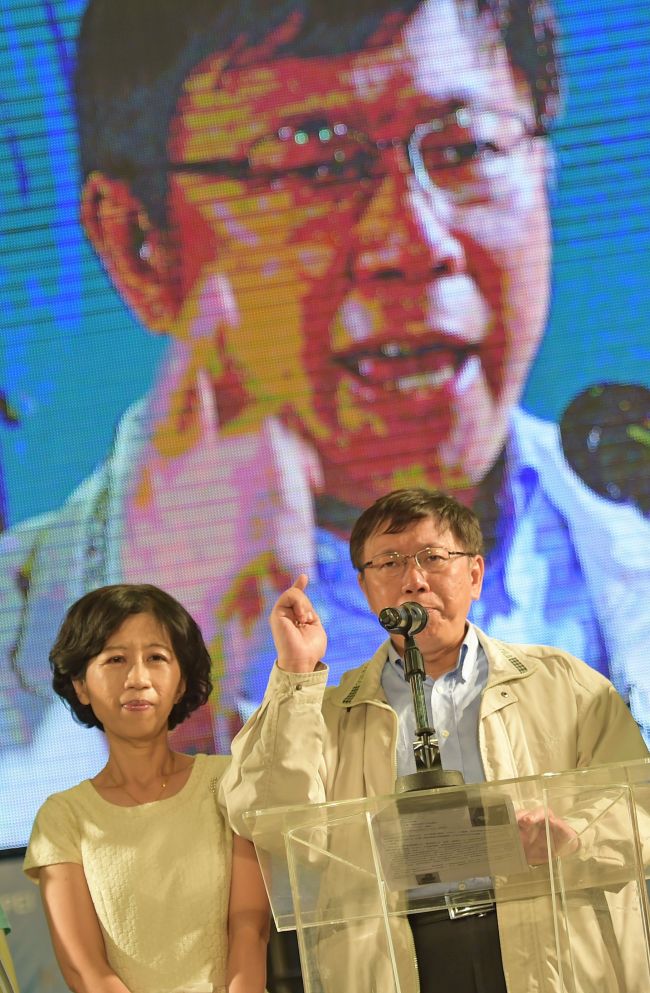TAIPEI ― Taiwan’s warmer relations with China were called into question after the island’s Beijing-friendly ruling party suffered its worst-ever polls defeat in local elections Saturday, sparking the resignation of Premier Jiang Yi-huah and the cabinet.
The rout came as the ruling Kuomintang party struggles to combat public fears of China’s growing influence, as well as a slowing economy and a string of food scandals.
Premier Jiang quit hours after the disastrous result, seen as a key barometer ahead of the 2016 presidential race. Taiwan’s 81-strong cabinet also formally stepped down Monday morning.
The current cabinet members will continue to serve as caretakers until a new lineup is selected by the next premier, who is likely to be chosen by embattled President Ma Ying-jeou in the coming days.
“As the cabinet is now entering into the caretaking period, I want to implore you to continue carrying out your roles until the new cabinet is formed... Hopefully the period won’t last too long,” Jiang said in a statement Monday.
Seen as a barometer before presidential elections in 2016, the poll results may now force the KMT to re-examine its China policy ― and encourage the opposition Democratic Progressive Party, which is traditionally Beijing-sceptic.
“The KMT are not likely to push the ties (with China) forward if they hope not to suffer another huge setback in the 2016 presidential race,” Ding Shuh-fan, a professor at National Chengchi University in Taipei, told AFP.
“At the same time China is also unlikely to make concessions and offer substantial economic benefits in talks” given the prospect of the DPP taking power in 2016, Ding added.
“It would be hard for cross-strait ties to move forward in the year ahead.”
Beijing called for “continued efforts for peaceful cross-strait relations” in the wake of the vote.
“We hope compatriots across the strait will cherish hard-won fruits of cross-strait relations, and jointly safeguard and continue to push forward peaceful development of cross-strait relations,” said Ma Xiaoguang, spokesman for the State Council’s Taiwan Affairs Office.
Taiwan and China split in 1949 at the end of a civil war, but Beijing still claims the island as part of its territory awaiting reunification ― by force if necessary.
Tensions rose markedly during the presidency of the DPP’s Chen Shui-bian from 2000-2008.
Since KMT President Ma Ying-jeou came to power in 2008 on a China-friendly platform, frosty ties have warmed, leading to a tourist boom of Chinese visitors to Taiwan as well as expanded trade links.
But there is public anxiety at the closer relationship. A proposed services trade pact with the mainland sparked mass student-led protests and a three-week occupation of Taiwan’s parliament earlier this year.
“The Ma administration has been too reliant on China economically,” said 32-year-old designer Tom Shen in Taipei.
“Many people fear that Taiwan will have to do as Beijing orders in the future.”
Two months of democracy rallies in Hong Kong could also have strengthened anti-Beijing sentiment, said Chang Wu-ueh, director of Tamkang University’s Graduate Institute of China Studies in Taipei.
“The pro-democracy protests in Hong Kong may have indirectly affected voters’ mood in Taiwan and deepened the negative perception of Beijing,” he said.
But Taiwan’s slowing economy will make it hard for any government to reject trade deals with China outright ― and even non-KMT politicians are not ruling out trade negotiations with Beijing.
“Given the huge amount of trade and civil visits across the strait, it would be unrealistic to halt immediately what is going on,” admitted Shen.
Ding said there was “no way to turn back the tide” of trade and investment relations.
The DPP’s current leader Tsai Ing-wen has moderated her party’s cross-strait stance since she was elected earlier this year.
The KMT took 40.7 percent of the ballots cast in the local polls, while the DPP scooped 47.5 percent.
There were 11,130 seats up for grabs with 18 million eligible voters ― turnout was 67.5 percent.
 |
Newly elected independent Taipei Mayor Ko Wen-je (right) speaks next to his wife Chen Pei-chi in front of a giant screen near his campaign headquarters in Taipei on Friday. (AFP-Yonhap) |
The KMT went from controlling four of the six major municipalities to just one, while its city and county seats were more than halved. It lost its key stronghold of Taipei, where independent candidate Ko Wen-je became mayor.
Taiwan’s United Daily News said Sunday the results were a “no-confidence” vote in the Ma administration.
“Ma must swiftly reform the party and government, otherwise there won’t be a future for the party in Taiwan,” it said.
The Liberty Times said Taiwan had given a “huge slap in the face” to the KMT, but warned the DPP against complacency.
“The election has set a clear guideline (for politicians) ― anyone who performs poorly will be replaced.”
Ma must stand down at the next elections as he has completed two terms. (AFP)








